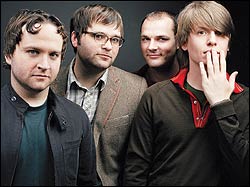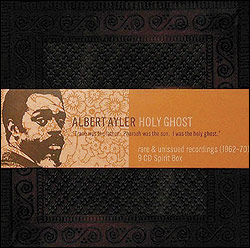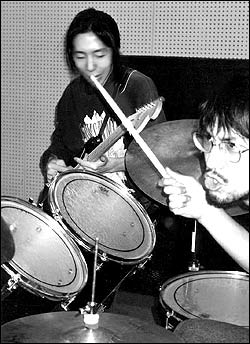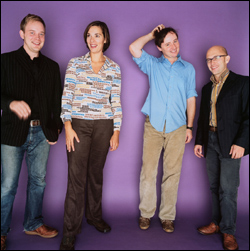Like a bar mitzvah boy stepping up to the podium, like a business-school grad being handed her first corporate credit card, like a virgin with a prom date and a pocket full of condoms, Ben Gibbard is ready for his big moment. Five previous Death Cab for Cutie albums have built up an audience ready to pounce on their major-label debut, Plans (Atlantic); it doesn’t hurt that his side project the Postal Service’s Give Up is reportedly the best-selling album ever on Sub Pop after Nirvana’s Bleach, or that The OC has made Death Cab synonymous with “what sensitive, underground-savvy kids like you listen to.”
There are touches of the Postal Service’s style all over Plans, beginning with the opening bars of the album—we hear a new wave keyboard before we hear a guitar—but success doesn’t seem to have steered them away from the basic style of 2003’s Transatlanticism. The advantage of a major-label budget is that nothing here seems like, as Death Cab once put it, the sound of settling. Producer/guitarist Chris Walla has outfitted the new album’s mix with all the modern conveniences: deeper richness for the bass, more layers to the guitars, sexier reverb on the cymbals. Most of all, it pushes Gibbard’s voice right up to the front. That’s a good idea: Gibbard’s specialty is tunes—the highest compliment he can think of here is “you’re the only song I want to hear/a melody softly soaring through the atmosphere”—and almost every phrase he sings lingers in the air.
Unfortunately, he’s a much less impressive lyricist—or, rather, he’s got a good ear for the sound of his words, and an occasional impressive turn of phrase, but playing to an audience of romance-minded youngsters in search of Deep Thoughts can make his words wince-worthy. Plans seems like it’s been fine-tuned to have its lyrics handwritten into high-school yearbooks. Gibbard looks at the girls in his songs with big puppy eyes, and his idea of a come-on is inevitably invoking love as a redemptive force (and hinting that mortality is lurking in the wings): “I know our filthy hands can wash one another’s/And not one speck will remain,” he croons on the single, “Soul Meets Body.” (That Manichaean soul-vs.-body thing is a big philosophical puzzler among tormented 11th-graders.) He explains a breakup of a seasonal romance by murmuring that “we’d left our love in our summer skin.”
Even when Gibbard’s playing a weasel, he’s playing a sensitive weasel. The power-ballad waltz “Someday You Will Be Loved” is sung from the point of view of someone explaining to “a girl . . . with eyes like the summer, all beauty and truth” (ick) that while he’s ducked out on her as she’s sleeping, she shouldn’t sweat it because this way she’ll find a nice boy sooner. (And even so, it’s got one great line: “Each broken heart will eventually mend/As the blood runs red down the needle and thread.”)
The song on Plans that will undoubtedly end up quoted next to the greatest number of senior-year portraits is “I Will Follow You Into the Dark,” which we know is supposed to be deep and serious because Gibbard is accompanied only by an acoustic guitar. It’s an agnostic’s attempt at consolation in the face of death: You will die eventually, he explains, but then I’ll expire too, and besides, we’ve done lots of stuff together, you and I. Once again, it’s got a terrific couple of lines in the chorus—”If heaven and hell decide that they both are satisfied/Illuminate the ‘no’s on their vacancy signs”—although it does sound like Gibbard’s singing “nose” until you parse the rest of the couplet. But it’s touching in the way that poignant moments in children’s movies are touching: You can experience its heart-tugging even as it’s clear that your heart is being professionally shunted into “tug” formation.
If you pay attention only to the sound of Plans, though, it’s loaded with small, pleasant surprises: the heart-on-sleeve piano opening of “Brothers on a Hotel Bed” tinged by the sound of somebody scraping the piano’s strings, the triple-time waterfall of keyboards at the end of “Different Names for the Same Thing,” the way that “Soul Meets Body” abruptly jerks back to a plucked guitar, a snare snap and Gibbard’s ba-ba-ba. Only the scribbly, distorted interludes grafted into “Someday You Will Be Loved” and “Crooked Teeth” seem out of place, gesturing toward indie-rock roots that Death Cab have moved past.
What ultimately makes Plans frustrating is Gibbard’s smooth, unflaking earnestness—it’s like listening to a salesman who keeps assuring you that now he’s going to give it to you straight. His singing voice and his writing voice have one setting apiece this time: “wistful.” There’s no sign of lust (that “eyes like the summer” bit is as close as he comes), no irreverence, no anger, not much fun. High-school sweethearts need something to put on mix CDs for each other, and they could do a lot worse than Death Cab, but the band is trying so hard to be loved that it’s sometimes hard to like.








